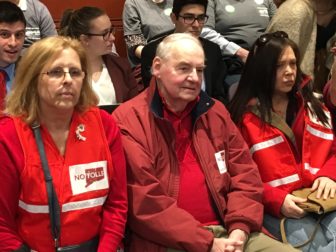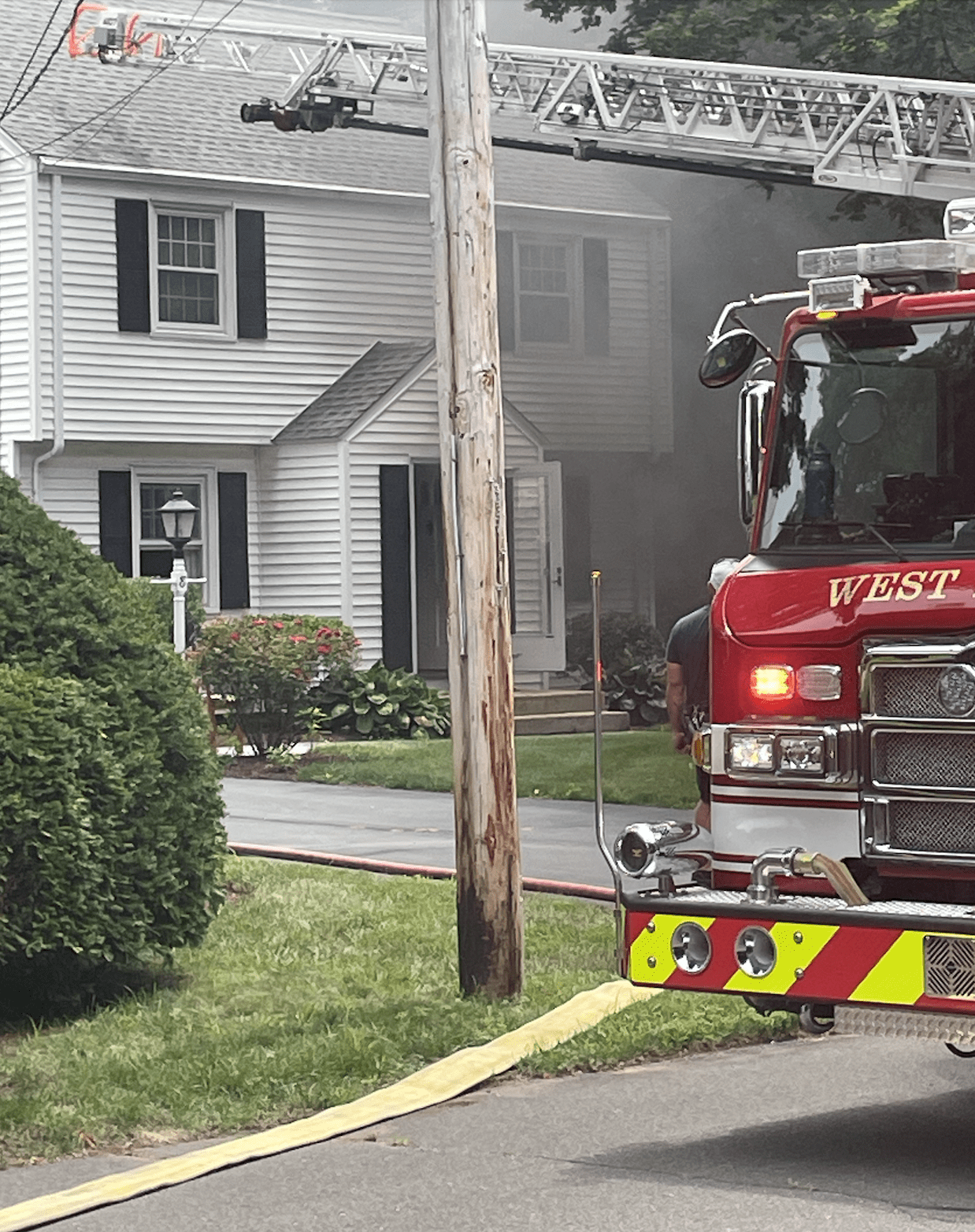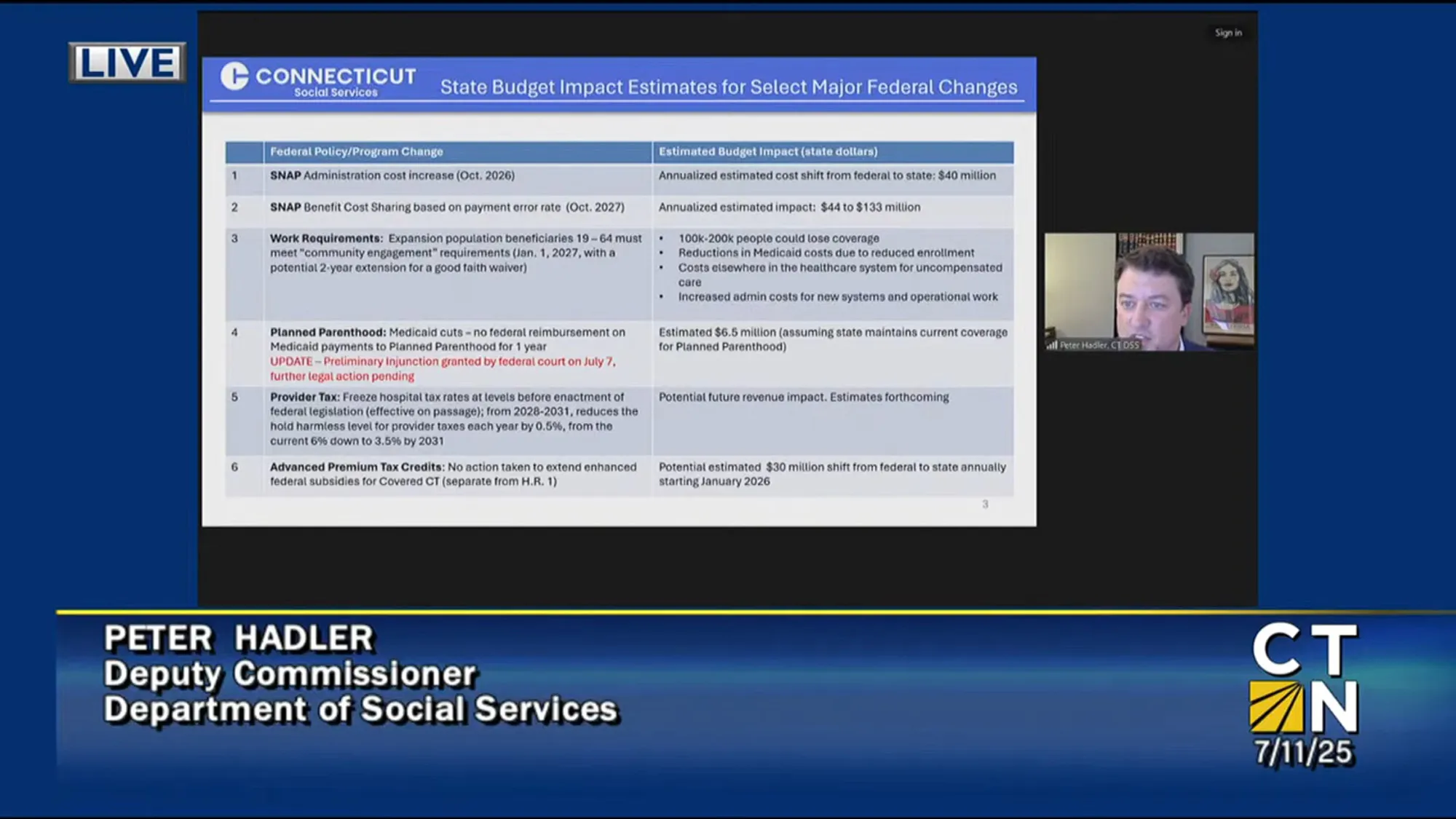Some Details on Tolls, but Little Common Ground

Audio By Carbonatix

Members of No Tolls CT listen to Gov. Ned Lamont’s press conference. Photo credit: Keith Phaneuf, CTMirror.org
Gov. Ned Lamont and others from the administration outlined how tolling might work, and a crowd of witnesses testified at a public hearing, many speaking out against the plan.
By Keith M. Phaneuf and Mark Pazniokas, CTMirror.org
The administration of Gov. Ned Lamont started Wednesday to fill in significant gaps in the Democratic governor’s expansive highway tolls proposal, a measure that instantly divided the legislature along partisan lines three weeks ago and became an early wedge issue in the 2020 elections.
At a press conference packed with invited supporters from the worlds of politics, labor and business, and then in a nearly three-hour presentation to the legislature’s Transportation Committee, the administration tried to regain the initiative in a debate dominated by opponents, a coalition of Republicans, trucking interests, and a grass-roots group, No Tolls CT.
“I think they helped frame the issue from an economic development standpoint, from a commuting standpoint and an infrastructure standpoint, and helped outline the serious deficiencies in our current system,” said Rep. Roland J. Lemar, D-New Haven, the committee’s co chair.
But Republicans on the committee were unpersuaded, as was Peter Sasser, the Stamford firefighter who founded the grass roots group, No Tolls CT. One in a long list of witnesses who lined up to object to tolling in a hearing that stretched well into the evening, Sasser made no effort to hide his anger in sharp exchanges with committee members.
“The public was lied to. The voters were lied to. The trust was broken,” Sasser said, referring to Lamont’s campaign position of favoring trucks-only tolls, a promise he abandoned on Feb. 16 by proposing tolls for all motor vehicles. “That’s why we’re so passionate about this.”
Rep. Laura Devlin of Fairfield, the ranking House Republican on the committee, said Republicans “violently agree” with the need for increased transportation infrastructure investments, but they heard nothing Wednesday that would convince them tolls are the right way to provide them.
“I don’t know that there was whole lot of new light that was shed,” Devlin said. “The encouraging thing I heard today was an ongoing willingness to continue to have conversations.”
A troika of administration agency heads, backed by planning and engineering staff from the Department of Transportation, made their case for why tolls are needed, what they generally would cost and what the system would look like to motorists. Leading the presentation were Melissa McCaw, the budget chief; Joseph Giulietti, the transportation commissioner; and David Lehman, the commissioner-designate of economic and community development.
The administration’s bill does not entertain legislative oversight over pricing, once the tolls are authorized, but McCaw told lawmakers that point is negotiable.
“The bill is a starting point for discussions,” McCaw said.
Tolls on the Merritt Parkway and Interstates 84, 91, and 95 generally would cost about four cents a mile, with 53 overhead electronic gantries silently noting drivers’ progress every six miles, Giulietti said. The tolls are projected by the administration to produced net annual revenues of $800 million.
State residents could get discounts of as much as 50 percent, the officials said, and prices would vary by time of day to address congestion. An earlier study estimated that about 30 percent of the tolls would be paid by out-of-state drivers, but the DOT now says their share would be 40 percent – a number some administration officials wore on their lapels.
Specifics would have to be vetted by the Federal Highway Administration, but officials have assured the state that tolls added to interstate highways would not cost Connecticut any federal highway funds.
“I have it in writing,” said Thomas J. Maziarz, the chief of policy and planning for the state DOT.
The governor did not address the committee, but he was one of eight speakers at a press conference aimed at framing the day’s news coverage around the theme of transportation investment as a much-needed vehicle to economic growth.
“What we’re doing is so important,” Lamont said. “We’ve got to bring our infrastructure, we’ve got to bring our transportation into the 21st century, and we have to do it now.”
H. Darrell Harvey, the co-leader of The Ashworth Company, a commercial real-estate company based in Stamford, said the tolls were vital to the state’s economic future. Traffic congestion is stifling economic growth in lower Fairfield County.
“It will help decongest our roads. The use of congestion pricing has been proven to work,” he said.
The DOT’s recommended rate of 4.4 cents per mile would be the same as what is charged to travel the Mass Pike and lower than what is charged in New York and New Jersey.
GOP lawmakers argue Connecticut can rebuild its transportation network without tolls.
But to do that, a major portion of borrowing currently reserved for other functions – about $700 million per year – must be redirected to complement the existing transportation bonding program.
And because toll revenues wouldn’t arrive until 2023, the Republican plan would invest far more in infrastructure than Lamont’s approach would over the next four years.
For example, the governor recommended about $1.6 billion in state borrowing for transportation over the next two-year budget. The GOP is recommending more than $2.9 billion – about 80 percent more than Lamont.
“Our plan brings certainty,” Senate Minority Leader Len Fasano, R-North Haven, said before the hearing.
But the Republican plan also would keep Connecticut on an overall borrowing program that Lamont says is unaffordable.
The governor has proposed a “debt diet” that would trim borrowing for municipal school construction and capital projects at state universities – the same pot the GOP’s “Prioritize Progress” program would dip into the enhance transportation work.
Fasano testified before the Transportation Committee, joined by Peter Malone, the chief executive officer of Thurston Foods, a Wallingford-based supplier of lunch foods to schools systems across the state and in Massachusetts.
The family-owned business has 215 employees, 60 trucks and 15 other vehicles that deliver food to 3,000 customers. Malone estimated that the tolls would cost his company at least $250,000 a year.
“The costs are going to get passed along. This is a tax,” Malone said.
Sasser, the founder of No Tolls CT who has aggressively criticized legislative supporters of tolls, was challenged by lawmakers.
Lemar first complimented him, praising his skills as an organizer.
“You’ve done a wonderful job,” Lemar said.
“On a shoestring,” Sasser replied.
Lemar asked Sasser to look at the legislative supporters of tolls as elected officials acting in good faith to preserve the state’s transportation system. Lemar ticked off a list of the needs.
“We have a disagreement on how to get there,” Lemar said.
House Speaker Joe Aresimowicz, D-Berlin, who is not a member of the committee, used his prerogatives as speaker to question Sasser, asking how he would respond to municipalities that want the state to continue funding school construction and other projects. The GOP plan would greatly limit the state’s abilities to fund those projects.
“Sir, I am not an elected official. I don’t know that answer. I can speak to you as a taxpayer. We pay our fair share. We pay and pay and pay,” Sasser said. “When does it stop?”
Reprinted with permission of The Connecticut Mirror. The authors can be reached at [email protected] and [email protected].
Like what you see here? Click here to subscribe to We-Ha’s newsletter so you’ll always be in the know about what’s happening in West Hartford!



